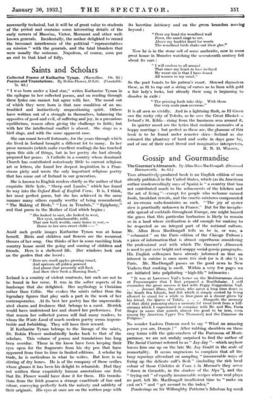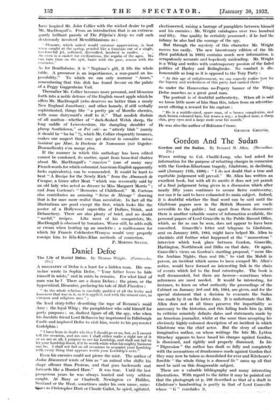Gossip and Gourmandise
The Gourmet's Ahnanach. By Allan ROSS MacDougall. (Desmond Herinsworth. 8s. 6d.) Tins attractively-produced book is an English edition of one already published in the United States, which (as its American author condescendingly says of Spain) is a country that has not contributed much to the refinements of the kitchen and the art of living "—except for people who welcome canned foods, breakfast cereals, and the emetic mixtures compounded at ice-cream soda-fountains as such. " The joy of oyster stew is practically unknown in ranee." But for the inexplic- able spread of cocktails throughout Europe, one might hazard the guess that this particular barbarism is likely to remain so in a land where civilization is old enough for cooking to be respected as an integral part of the national culture. Mr. Allan Ross MacDougall tells us he is, or was, a columnist " on the Paris edition of the Chicago Tribune : a piece of information that is almost superfluous considering the professional zeal with which The Gourmet's Almanac!: is used to put over bright and snappy social gossip paragraphs. His English colleagues have already .informed us that an interest in cuisine is once more Ns snob (or is it chic?) in Paris. Mr. MacDougall passes on the good news to New Yorkers that cooking is swell. Within a very few pages we ure initiated into palpitating "high-life" intimacies : " It was at Lawrence Voir s house on the Mediterranean shore at Pramousquier that I first prepared a Bouilhsbaise. I still remember the great success it had with Peggy Guggenheim Vail.
. . Jerome Blum, the artist, who spent a long time down in the South Bea Islands, had fish which is simply cooked by being allowed to stand for a while in lime-juice at a dinner given by his friend, the Queen of Tahiti. . . . Alongside the memory of that (fish) poisoning stays a memory (of trout fresh from a hill- stream) which I experienced in company with Mr. and Mrs. Paris Singer (a name that sounds almost too good to be true, even among the American Upper Ten Thousand) and the Princesse do Polignae."
No wonder Isadore Duncan used to say " What an amazing person you are, Dougie I " After rubbing shoulders on these easy terms with the gate-crashers of the Parnassus of Mont- parnasse, we are not unduly surprised to find the author of The Social Contract referred to as " Jay.Jay "—which anyhow leaves him one up on the late Mr. Jay Gould in the scale of immortality. It seems ungracious to complain that all the busy reportage attendant on sampling " innumerable ways of fixing up the delicate calf's flesh" (including the rich local colour of those Coteleltes de Veau 1: to Marrnat'e they serve " down in Grenoble, in the shadow of the Alps "), and the " trying out " of equally innumerable recipes where veal plays no part, left Mr. MacDougall insufficient time to " make au end on't " and " get around to the index."
Ponderings on Sir Willoughby Patterne's fabulous leg must have inspired Mr. John Collier. with the wicked desire to pull
Mr. MacDougall's. From an introduction that is an extrava- gantly brilliant parody of The Filgrines Scrip we cull such dexterously involved Meredithianisms as : " Pleasure, which naked would outstare appreciation, is best when caught at the spring, pearled like a fountain out of. a single, too-forceful jet, softened, diversified, lambent in smiles. . . . An oven is a casket for civilizations, the regalia of the ages. WO ran turn time on the spit, baste with the past, season with the centuries."
As for Bouillabaise, it is " Neptune's gift, it fills the whole table. A precursor is an impertinence, a rear-guard an im- possibility." To which we can only murmur " Amen," remembering that this dish has found favour on the palate of a Peggy Guggenheim Vail.
Thereafter Mr. Collier becomes more personal, and blossoms forth into a noble defence of the English russet apple which he offers Mr. MacDougall (who deserves no better than a mealy New England Jonathan) ; and other homely, if still verbally sophisticated, things like " a pretty pie of Morello cherries, with some dairymaid's stuff to it." That modish disdain of all mutton—whether of " dark-fleshed Welsh sheep, the long saddle of Leicestershire, the dumpling shoulder of plump Southdown," or Pre cali—as "utterly blah " (surely it should be " ba-ba " ?), which Mr. Collier eloquently trounces, makes one suspect that reux qui doivent la connaltre mieux insistent que Mine. la Duehesse de Nomsonore (née Gogetter- Tlantmelkeule) n'en mange plus.
If the manner in which this anthology has been edited cannot be condoned, its matter, apart from loose-leaf chatter about Mr. MacDougall's " connives " (one of many racy French words for which columnist American-English apparently Jacks equivalents), can be commended. It would be hard to beat " A Recipe for the Newly Rich " from the Almanach de Cocagne, a Grace after Meat " which was reverently said by an old lady who acted as dresser to Miss Margaret Morris " ; and Jean Cocteau's " Memories of Childhood." M. Cocteau also contributes an amusing " Scene de Menage " drawing that is for once more realist than surrealists. In fact all the illustrations are good except the first, which looks like the poster of a Hollywood super-film of Dollars, Drink, and Debauchery. There are also plenty of brief, and no doubt " useful," recipes. Like most of his compatriots, Mr. MacDougall is obsessed by tomatoes. Worse still, he adds milk or cream when beating up an omelette : a malfeasance for which Sir Francis Colchester-Wemyss would very properly consign him to Klu-Klux-Klan methods of correction.
P. MORTON SHAND.





































 Previous page
Previous page